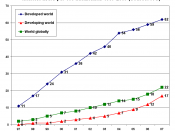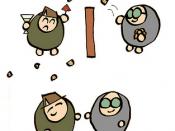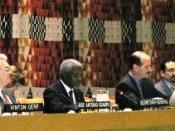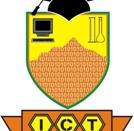As Chang-de Liu notes, there's no doubt that technology will make a job significantly less complex, thus requiring less skill. This is the negative impact that technology has on the labour force. Technology or ICTs (information and communication technologies) are participating in the role of deskilling workers. As new technology is adopted in organizations, it is evident with the change in technological evolution there is a clear picture on the reductions in skill, autonomy and wages for employees.
Technology is a powerful tool as Liu notes. It harnesses the ability to create jobs, to build a stronger economy and to fuel an entire organization. However with these positives aspects there is a dark side that lies within technology. Although it may create new employees because of the growth of new jobs in the service sector it exceeds the losses of traditional jobs in the manufacturing sector. (Campbell) Technology is also a growing field.
The technological change has created a standard in which employees must be knowledgeable to adapt and keep up with new technology. With the increase in change there is a greater demand for more highly skilled workers thus they have to "keep learning new skills along with the development of technology" (Block).
In the article "De-skilling Effects on Journalists: ICTs and the Labour Process of Taiwanese Newspaper Reporters", Liu describes how the journalism field was re-engineered due to technology. With the invention of the Internet it made it seem that gathering information for stories and articles was a whole lot easier. Liu commented that "Journalists became "news gatherers rather than news writers"" (Liu). Writers can just as easily pull up statistics straight from the Internet to support their argument/story. Another contributing factor in the de-skilling of journalists was the invention of the computer and word processing programs. The traditional role of the typist was viewed as having specific skills in order to improve productivity through accuracy and speed. Word processors and computers have seen to remove these skills as errors can be correct without wasting resources. Accuracy and speed can be built through very simple practice in analyzing the explicit details of the program such as alignment, margins and columns since they are all built in. "With word processing programs, reporters are able to replicate stories immediately with only several clicks of the mouse. As duplicating paragraphs, or even whole files, is easy, reporters have become accustomed to obtaining paragraphs that have already been written by other reporters or from press releases." (Liu)With this increase in technology there has been an evident increase in the workload and pressure. Since these technological advancements have made life easier on behalf of the reporter they must meet more strict deadlines, a 20% increase in the word count, and additional articles for the online medium to cater to digital readers. (Liu) Cell phones, computers and laptops are all tools that can capture any story and possess the ability to write one. Although these devices have shortened communication time significantly, it doesn't disregard the fact that reporters now work 24 hours a day. "But, it seems that I am always on duty - twenty-four hours a day, seven days a week. Even after the deadline, I still have to check my e-mail account and news stories on websites and TV to know if there was any accident on my beat"" Said one respondent. (Liu)It seems with these ICT's the authenticity of the journalism field has degraded in many ways. Virtually anyone that has access to a computer can easily write a story in any specific issue. Although it may not be recognized by local newspapers it will be recognized by a far greater medium: the Internet. People's perceptions change as some readers are more reclined to read blog's rather than professionally written stories. For instance during the September 11th terrorist attacks there was a huge increase in citizens reporting in the form of social blogs, forums, and email. Some survivors would post their own tragic experiences of what actually happened which were not fully captured by mainstream media. This sparked the interest of readers beginning to view blogs and forums as their own personal news hub.
In conclusion there is an evident fact that the de-skilling on journalists is quite present in the 20th-21st century. As Liu mentioned, the computer, internet, and the pressure of society has all influenced the de simplification of this field. Also ICT's have also contributed to the creditability of reporters and writers as they are being shadowed by personal bloggers, chatrooms and forums. There is a definite rise of online social mediums. De-skilling doesn't only affect reporters; there is an abundant of jobs that ICT's have caused a downgrade in skill. We can look at librarians, nurses, office workers, secretaries, etc. These effects of de-skilling can be seen in the form of feminization. Society and ICT's has changed the job prospects that were originally for suited for me, to a job that is more suitable for women. Prior to the 21st century, secretaries were predominately ruled by males; during the growth in technology (computers, electronic database systems etcâ¦) it had a deskilling effect on the job and making it a female dominated role. Although these ICT's have created more jobs for women in the past few decades there is still sexual inequality in the workplace, especially in terms of the pay gap, promotions, and work-like benefits. I fear that ICT's will have a larger impact than it already does. Rather than de-skilling jobs it possesses the power to completely eliminate jobs.
Works CitedBlock, Fred L. (1990). Postindustrial possibilities: A critique of economic discourse. Berkeley & Los Angeles, CA: University of California.
Campbell, Duncan. (2001). Can the digital divide be contained? International Labour Review, 140(2), 119-141.
"Chang-de Liu." De-skilling Effects on Journalists. 2006. CJC Online. 3 Nov. 2008 .








